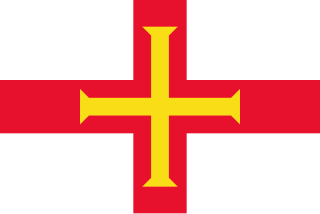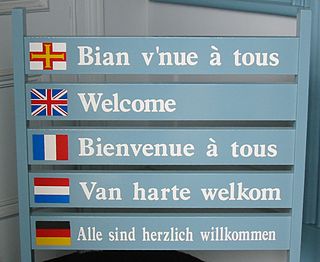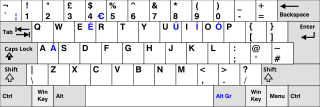
The Channel Islands are an archipelago in the English Channel, off the French coast of Normandy. They are divided into two Crown Dependencies: the Bailiwick of Jersey, which is the largest of the islands; and the Bailiwick of Guernsey, consisting of Guernsey, Alderney, Sark, Herm and some smaller islands. Historically, they are the remnants of the Duchy of Normandy. Although they are not part of the United Kingdom, the UK is currently responsible for the defence and international relations of the islands. The Crown Dependencies are neither members of the Commonwealth of Nations, nor part of the European Union. They have a total population of about 171,916, and the bailiwicks' capitals, Saint Helier and Saint Peter Port, have populations of 33,500 and 18,207 respectively.

Guernsey is the second largest island in the Channel Islands, located 27 miles (43 km) west of the Cotentin Peninsula, Normandy. It forms the major part of the jurisdiction of the same name, which also comprises three other inhabited islands and many small islets and rocks. The jurisdiction has a population of 63,950 and the island has a land area of 24 square miles (62 km2).

Jersey, also known as the Bailiwick of Jersey, is an island country and self-governing British Crown Dependency near the coast of north-west France. It is the largest of the Channel Islands and is 14 miles (23 km) from the Cotentin Peninsula in Normandy. The Bailiwick consists of the main island of Jersey and some surrounding uninhabited islands and rocks including Les Dirouilles, Les Écréhous, Les Minquiers, and Les Pierres de Lecq.
Jersey is the most populated of the crown dependencies and of the Channel Islands. The Demographic statistics of the island includes population density, ethnicity, education level, health of the populace, economic status, religious affiliations and other aspects of the population.

The northern region of Europe has several definitions. A restrictive definition may describe Northern Europe as being roughly north of the southern coast of the Baltic Sea, which is about 54°N, or may be based on other geographical factors such as climate and ecology.
Jèrriais is a Romance language and the traditional language of the Jersey people. It is a form of the Norman language spoken in Jersey, an island in the Channel Islands archipelago off the coast of France. Its closest relatives are the other Norman languages, such as Guernésiais, spoken in neighbouring Guernsey, and the other langues d'oïl.

The langues d'oïl are a dialect continuum that includes standard French and its closest autochthonous relatives historically spoken in the northern half of France, southern Belgium, and the Channel Islands. They belong to the larger category of Gallo-Romance languages, which also include the historical languages of east-central France and western Switzerland, southern France, portions of northern Italy, the Val d'Aran in Spain, and under certain acceptations those of Catalonia.

Norman or Norman French is a Romance language which can be classified as one of the langues d'oïl, which also includes French, Picard and Walloon. The name "Norman French" is sometimes used to describe not only the Norman language, but also the administrative languages of Anglo-Norman and Law French used in England. For the most part, the written forms of Norman and modern French are mutually intelligible. This intelligibility was largely caused by the Norman language's planned adaptation to French orthography (writing).

Guernésiais, also known as Dgèrnésiais, Guernsey French, and Guernsey Norman French, is the variety of the Norman language spoken in Guernsey. It is sometimes known on the island simply as "patois". As one of the langues d'oïl, it has its roots in Latin, but has had strong influence from both Old Norse and English at different points in its history.

The English language in Europe, as a native language, is mainly spoken in the United Kingdom and Ireland. Outside of these states, it has official status in Malta, the Crown Dependencies, Gibraltar and the Sovereign Base Areas of Akrotiri and Dhekelia. In the Netherlands, English has an official status as a regional language on the isles of Saba and Sint Eustatius. In other parts of Europe, English is spoken mainly by those who have learnt it as a second language, but also, to a lesser extent, natively by some expatriates from some countries in the English-speaking world.

The culture of Jersey is the culture of the Bailiwick of Jersey. Jersey has a mixed Franco-British culture, however modern Jersey is culture is very dominated by British cultural influences and has also been influenced by immigrant communities such as the Bretons and the Portuguese.

The Channel Islands are located in the English Channel, by Normandy, France. The two bailiwicks, Guernsey and Jersey, are not a part of the United Kingdom, but since the 20th century are majority English-speaking and part of the British cultural sphere. They also share a historic cultural identity with the people of Normandy.

The culture of Guernsey in the Bailiwick of Guernsey is a culture which has been shaped by its indigenous Norman language and traditions as well as French and British cultural influences. Cultural trends from immigrant communities such as the Portuguese have also been added.
Sercquiais, also known as lé Sèrtchais, Sarkese or Sark-French, is the Norman dialect of the Channel Island of Sark.
Auregnais, Aoeur'gnaeux, or Aurignais was the Norman dialect of the Channel Island of Alderney. It was closely related to the Guernésiais (Guernsey), Jèrriais (Jersey), and Sercquiais (Sark) dialects of the neighbouring islands, as well as continental Norman on the European mainland.

The Jersey Evening Post (JEP) is a local newspaper published six days a week in the Bailiwick of Jersey. It was printed in broadsheet format for 87 years, though it is now of compact (tabloid) size. Its strapline is: "At the heart of island life".

Jersey Legal French, also known as Jersey French, was the official dialect of French used administratively in Jersey. Since the anglicisation of the island, it survives as a written language for some laws, contracts, and other documents. Jersey's parliament, the States of Jersey, is part of the Assemblée parlementaire de la Francophonie. The use of the English language has been allowed in legislative debates since 2 February 1900; the current use of French in the States of Jersey is generally restricted to certain limited official state functions and formalities.

The Bailiwick of Jersey, a crown dependency in the Channel Islands, off the French coast of Normandy, has two official languages: English and French. Traditionally, Jèrriais, a variety of the ancient Norman language, has been the dominant language of the Bailiwick, but the past century has seen a great decline in its usage, as well as in the use of French.
Channel Island English refers to Alderney English, Guernsey English and Jersey English and similar dialects of English found in the other Channel Islands.

The Jersey people, also referred to as Islanders, are an ethnic group and nation native to the island of Jersey in the Channel Islands who share a common history, Norman ancestry and culture. There is no standard demonym for Jersey people, however common demonyms include Jerseyman/Jerseywoman or Jèrriais. Jersey people are colloquially known as 'beans', after the Jersey bean crock - a traditional meal, or crapauds, the reason being that Jersey has toads and Guernsey does not. There is a statue in St. Helier of a toad, known as Le Crapaud. The Jersey toad is a unique species, which are bigger, breed earlier and use different habitats than English toads.















